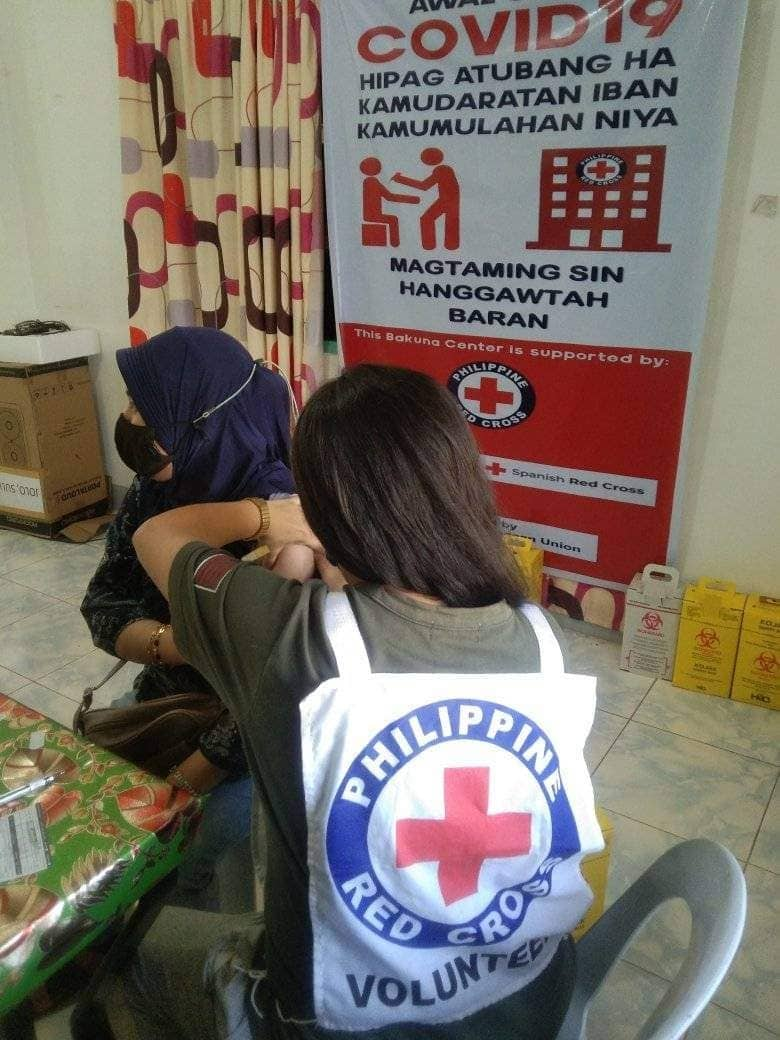
The Philippine Red Cross (PRC) has administered 11,263 doses of Covid-19 vaccines in Sulu province, through the PRC Mobile Bakuna Team, resulting in over 3,000 people fully inoculated and/or boosted. PRC Sulu Chapter Bakuna Team was deployed to support vaccination efforts at the Jolo Municipal Rural Health Unit, the Jolo Municipal Bakuna Center, and Barangay Bus-Bus Health Station.
Sulu is currently under Covid-19 alert level 2. Other places where PRC conducts vaccinations in Mindanao are Tawi-Tawi, Cotabato City-Maguindanao, Misamis Oriental-Cagayan de Oro, Davao del Sur, Surigao del Norte, Sultan Kudarat, Marawi City, and Zamboanga City.
The vaccinations are part of the PRC’s Covid-19 response across the country. As of June 20, 2022, PRC has administered 1,199,452 doses of Covid-19 vaccines, including boosters, in the whole country, fully vaccinating 373,631 persons.
PRC Chairman and CEO Richard J. Gordon constantly encourages Filipinos to get vaccinated or boosted. “Ang aming chapters sa Red Cross ay patuloy na nagbabakuna laban sa Covid-19 upang maging ligtas ang lahat sa banta nito” Chairman Gordon said.
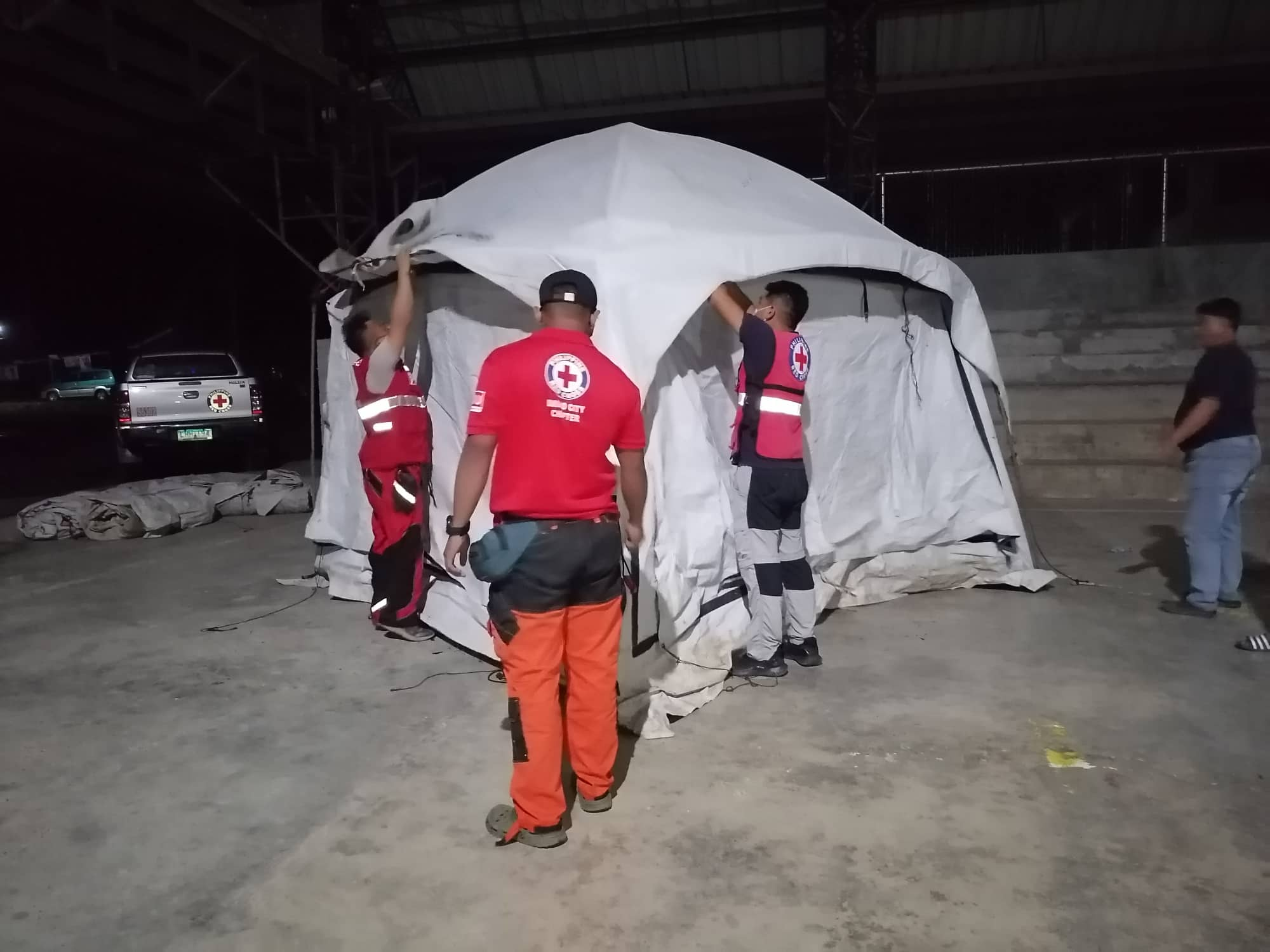
On June 21, 2022, the Philippine Red Cross (PRC) Operations Center (OpCen) at National Headquarters received a fire alarm call at 3:53 PM regarding an ongoing fire at Purok 1, Barangay Andili, in Mawab, Davao de Oro. Immediately upon receipt of the call, OpCen had the local Davao PRC Chapter emergency personnel check on the situation while an ambulance unit arrived on site to provide medical assistance to victims in need of such.
More than 52 families with 162 individuals were affected by the fire that raged for more than five hours in a residential and commercial area, reaching the second alarm. It was allegedly caused by an unattended rice cooker. As the fire was finally put under control at 9pm, PRC planned deployment of its food trucks to provide hot meals prepared by PRC’s Welfare Services Team to those affected.
“Patuloy ang paghahatid ng pag-asa ng Red Cross sa mga labis na naapektuhan ng sunog kahit sa Davao de Oro. Laging handang tumulong ang PRC sa pangangailangan, alinsunod sa aming layunin na maging laging una, laging handa, at laging nandyan para sa ating mga kababayan,” PRC Chairman and CEO Richard J. Gordon said.
The local PRC Chapter deployed an ambulance with a 3 man team that assessed the situation at the evacuation Center where a First Aid station and Welfare desk with 2 trained personnel was set up. Six large tents were then installed at the Barangay Andili Gymnasium in Mawab as temporary shelter for the affected families. The PRC Activity Plan schedule is to continue to have a Welfare desk set-up, to conduct a Hygiene Promotion briefing with hygiene kits being distributed after and to conduct psychosocial support for all the families concerned.
PRC resources such as fire trucks, ambulance units, food trucks, and specially trained emergency personnel are part of its national rescue and relief teams serving emergency needs all over the country.
Gordon said, “Laging handang tumulong ang Philippine Red Cross sa mga fire emergencies kahit saan naganap. Agad nating ipinadala ang ating resources upang mabilis ang pag-rescue at tulong. Mag-iingat din tayo dahil marami and nangyayaring sunog sa ngayon kahit nag-umpisa na ang tag-ulan. Fire Safety begins at home – identify fire hazards and plan out evacuation measures in case of fire to uphold the safety of everyone.”
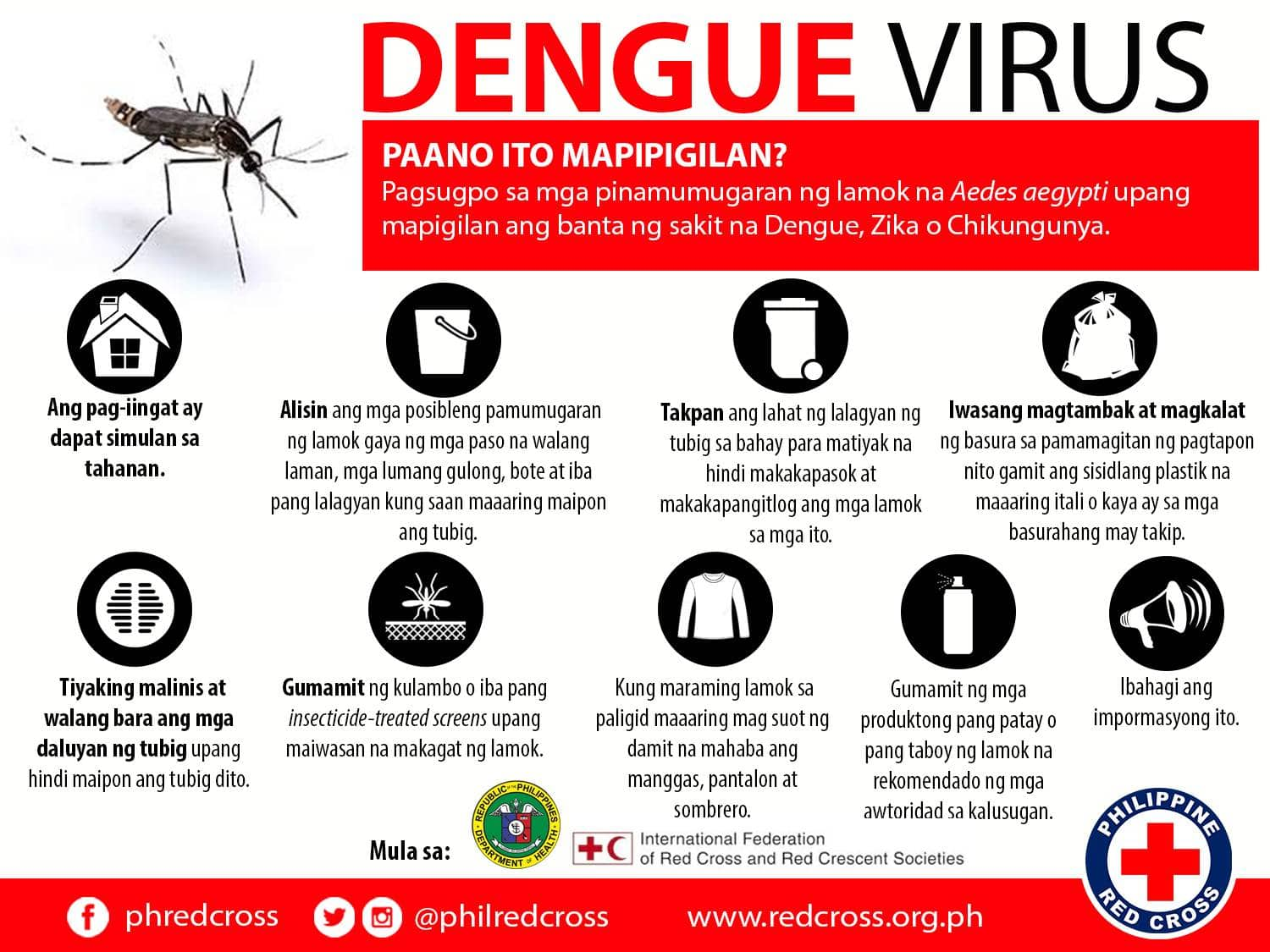
The Philippine Red Cross (PRC) warned the public of dengue fever risk and gave advice on how it can be prevented as the country observes Dengue Awareness Month in June.
The PRC Health Services explained that dengue fever is a mosquito-borne infectious disease that causes a severe flu-like illness. It can progress into two life-threatening conditions: dengue hemorrhagic fever and dengue shock syndrome. The virus that causes dengue is passed on to humans from animals through the bite of an infected mosquito.
The symptoms are sudden onset of high fever, which may last from 2 to 7 days; joint and muscle pain and pain behind the eyes; weakness; skin rashes; nose bleeding when fever starts to subside; abdominal pain; vomiting of coffee-colored matter; dark-colored stools; and difficulty of breathing.
PRC reminds the public of the 4 Ss to prevent dengue:
Search and Destroy: Cover water drums and pails; Replace water in flower vases once a week; Clean gutters of leaves and debris; Collect and dispose of all unusable tin cans, jars, bottles, and other items that can collect and hold water.
Self-Protection Measures: Wear long pants and a long-sleeved shirt; Use mosquito repellent every day.
Seek Early Consultation: Consult the doctors immediately if fever persists after 2 days and rashes appear.
Say Yes to Fogging when there is an impending outbreak or a hotspot.
The PRC Health Services gives the following advice: If medicine for fever will be given, do not give aspirin. Ensure a person suspected of having dengue is well hydrated. If fever or symptoms persist for 2 or more days, bring the patient to the nearest hospital.
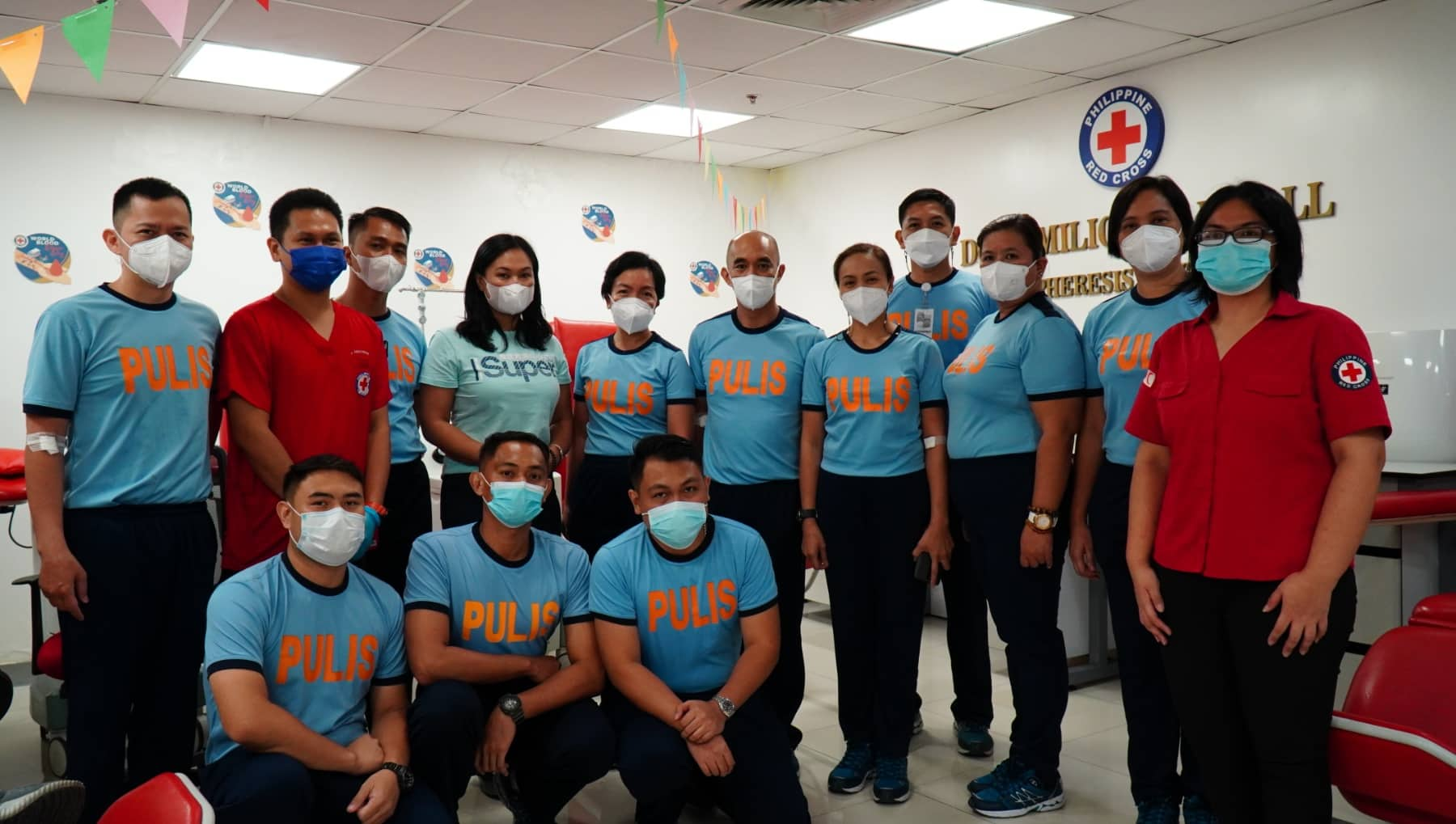
Personnel of the Philippine National Police General Hospital (PNPGH), from Camp Crame, donated blood at the Philippine Red Cross (PRC) National Headquarters, in Mandaluyong City, today, June 14, 2022. The donors came in response to PRC’s call for blood donors on World Blood Donor Day.
Headed by Chief Nurse Police Colonel Geraldine L. Adanglao, around 16 personnel from the PNPGH joined PRC’s bloodletting activity.
PCOL Adanglao herself has been donating blood since 2012. She explained that blood itself is life, and saves lives. As chief nurse of the PNPGH, she has firsthand knowledge of the impact of the availability of a safe and adequate supply of blood products.
Aside from the psychological benefit of being able to help others, the chief nurse and police colonel also explained that donating blood is beneficial to the physical health of the donor. An additional benefit is that the donor gets tested for diseases, which is a requirement prior to blood donation.
PCOL Adanglao encouraged everyone — those who have not experienced donating blood and those who have — to do so. “Blood donation extends lives. It saves lives,” she says.
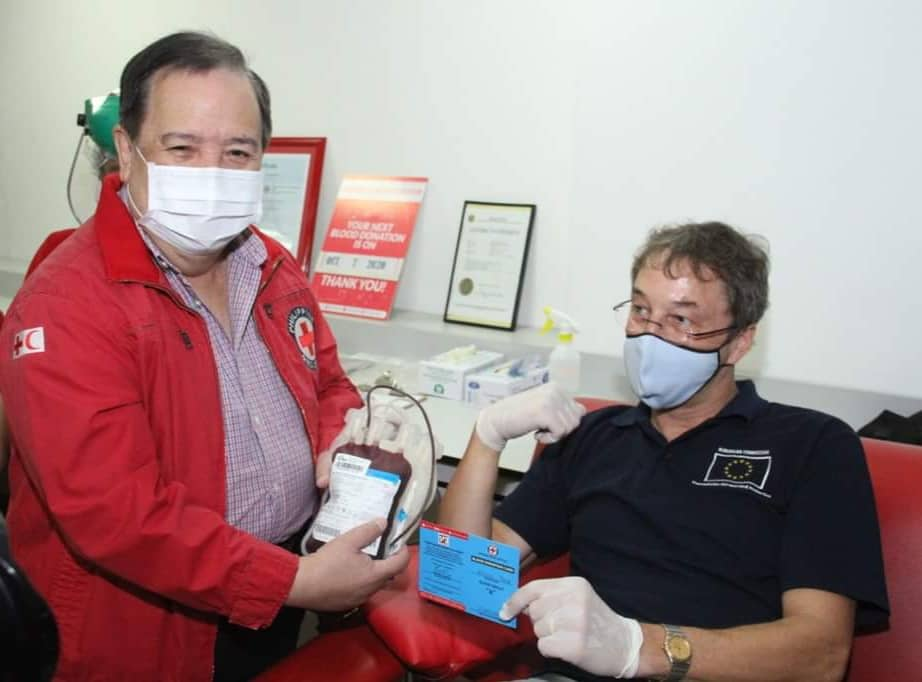
With this year’s theme “Donating blood is an act of solidarity. Join the effort and save lives”, the Philippine Red Cross (PRC) celebrates World Blood Donor Day, today June 14.
As one of the major suppliers of blood and blood products in the country, the PRC National Blood Services (NBS) continuously delivers adequate, safe, and quality blood supply to the most vulnerable. This year, the PRC has already collected 159,686 blood units and dispensed 169,799 blood units to 96,567 patients.
“Sa pagdiriwang natin ng World Blood Donor Day, taos-puso kong pinasasalamatan ang lahat ng ating mga donors. Mula noong 1947 hanggang ngayon, ang Red Cross ang isa sa mga nangunguna pagdating sa blood services. Kaya naman, mas marami tayong naihahandog sa ating mga kababayang nangangailangan ng ating serbisyo,” PRC Chairman and CEO Richard Gordon said.
Chairman Gordon encourages healthy individuals to donate blood regularly in 100 facilities of PRC as this act saves lives as well as promotes the donor’s own health.
In the pipeline for access and blood donations and blood requests, the PRC is expanding its network of blood facilities by establishing more units in strategic areas. For immediate assistance, the blood delivery system is also offered to patients.
To know more about the blood services and details of today’s event, email us at [email protected] or contact (02) 790-2300 local 931/932/935. The PRC Blood Call Center which accommodates blood requests and inquiries nationwide may be reached by dialing 143.
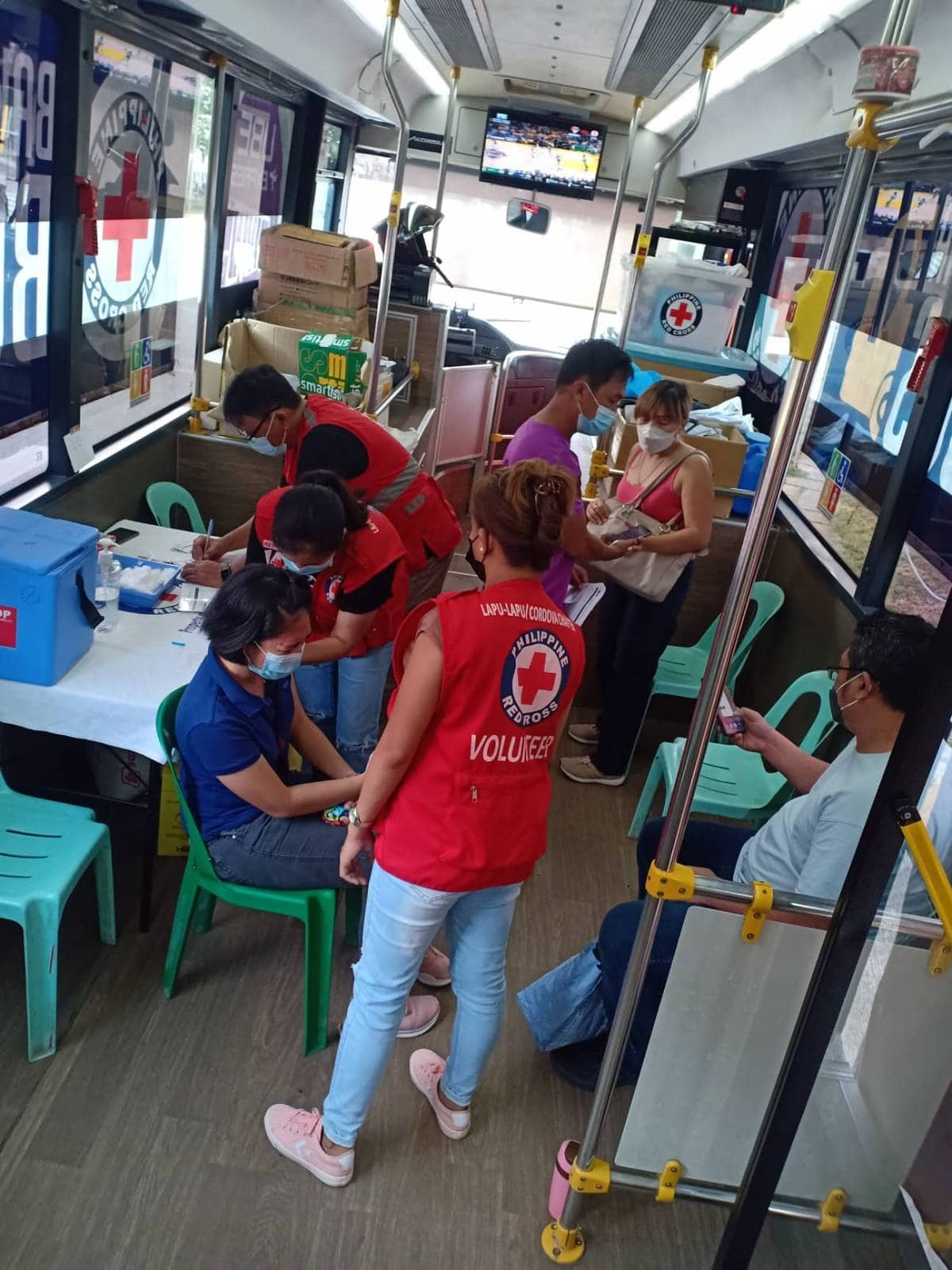
The Philippine Red Cross (PRC) has administered 22,021 doses of Covid-19 vaccines in Lapu-Lapu City and Cordova town, in Cebu province, through the PRC Mobile Bakuna Team, fully inoculating 5,630 persons.
Lapu-Lapu is currently under Covid-19 alert level 1, while Cordova is on alert level 2. Other PRC vaccination sites in Visayas are in Bohol, Capiz, Negros Occidental, Aklan, Bogo, Iloilo City, Cebu City, Cebu province, and Roxas City.
The vaccinations are part of the PRC’s Covid-19 response across the country. As of June 9, 2022, PRC has administered 1,190,940 doses of Covid-19 vaccines, including boosters in the whole country, fully vaccinating 372,963 persons.
PRC Chairman and CEO Richard J. Gordon encouraged Filipinos again to get vaccinated and those who are qualified to have the first or second booster shots to get them. “Ang Philippine Red Cross ay laging handa at laging nandyan, hanggang sa maging ligtas ang mga Pilipino sa banta ng Covid-19,” Chairman Gordon said.
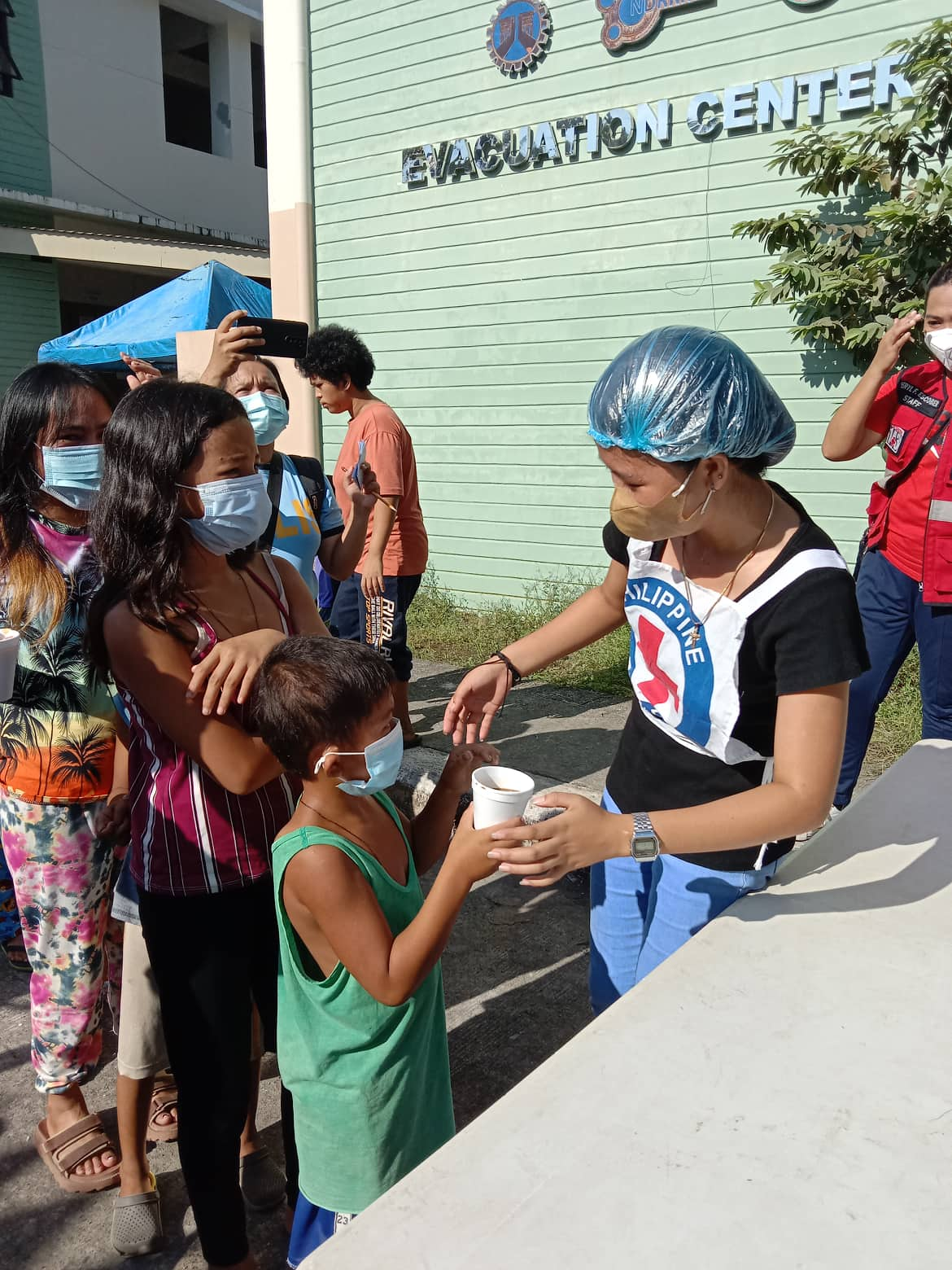
As of 8:00 am today, June 8, 2022, the Philippine Red Cross (PRC) has deployed volunteers and members of its basic services teams to Juban, Sorsogon, in the wake of Mt. Bulusan’s eruption last Sunday, June 5.
The PRC Welfare Services Team, which set up two Welfare Desks, provided psychosocial first aid (PFA) to 699 adults and child-friendly activities designed as PFA to 76 children who fled the Mt. Bulusan eruption. A PRC food truck, called Hot Meals on Wheels, was deployed when the volcano erupted on Sunday, June 5, and has served hot meals to 714 individuals as of 8:00 am today.
The PRC Safety Services Team, which sent one ambulance unit with trained emergency medical services personnel, set up one First Aid station and is on standby to treat and transport patients to medical facilities if needed. The team has served 59 individuals who had their blood pressure taken and has treated three patients for minor injuries. The Water, Sanitation, and Hygiene (WASH) Unit has conducted a hygiene promotion activity for 136 individuals.
PRC Chairman and CEO, Senator Richard J. Gordon, is monitoring the situation in Juban and providing the necessary directions to PRC volunteers and staff. “Ang Philippine Red Cross volunteers at staff ay may kasanayan at laging handang rumesponde sa ating mga kababayan sa ganitong mga oras ng emergency,” Chairman Gordon said.M
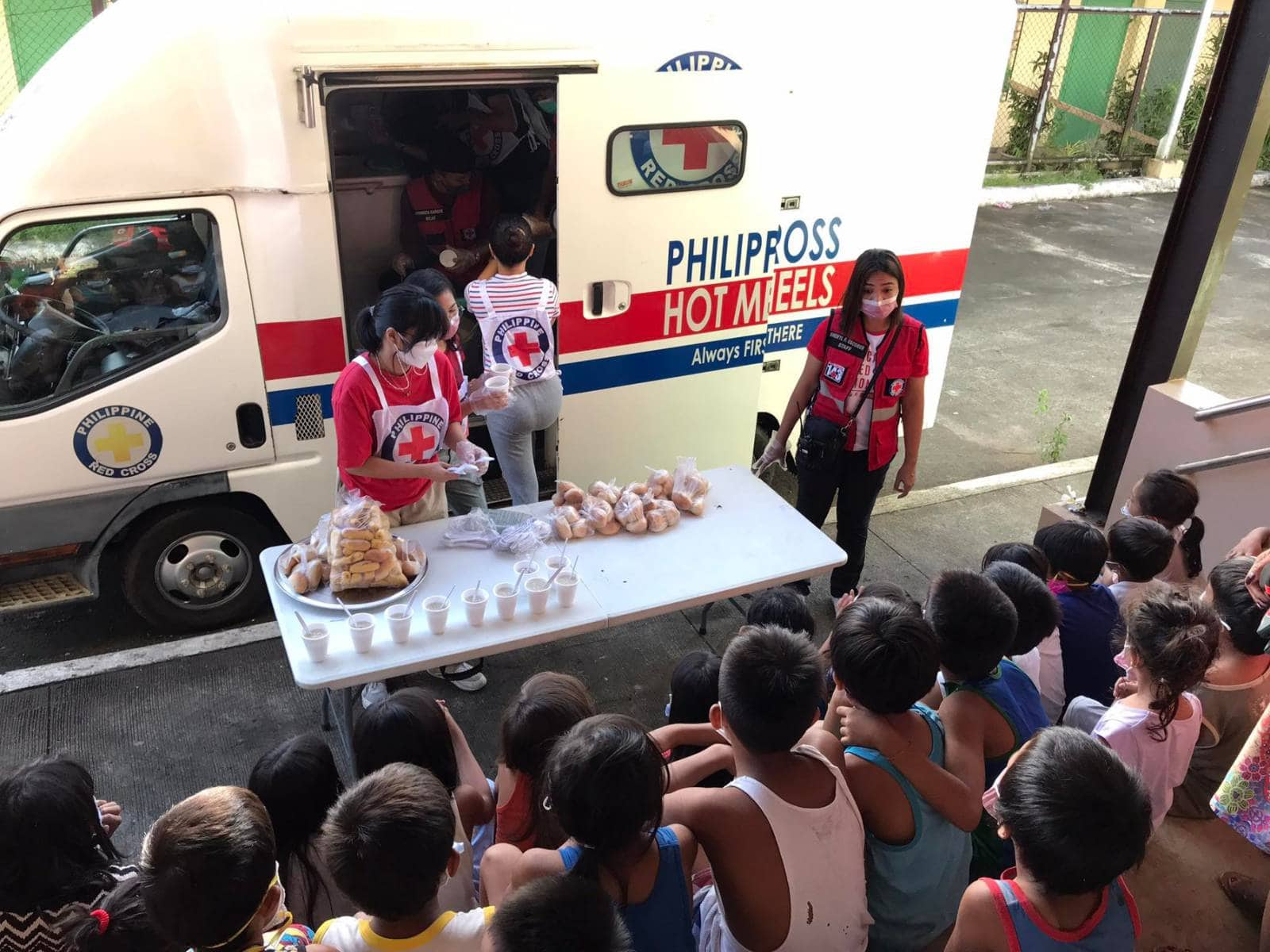
The Philippine Red Cross (PRC) Hot Meals on Wheels distributed hot meals to 180 individuals displaced by the eruption of Mt. Bulusan, in Juban, Sorsogon yesterday, June 5, 2022.
PRC Chairman and CEO, Senator Richard J. Gordon, immediately mobilized PRC’s staff and volunteers and pre-positioned equipment and supplies as soon as he heard the news of the volcanic eruption. PRC deployed one food truck, from its Albay Chapter, as part of its Bulusan Volcanic Eruption Response. “Ang Philippine Red Cross ay laging handang tumulong sa ating mga kababayan sa oras ng mga ganitong emergency,” PRC Chairman Gordon said.
The PRC Welfare Team also set up one Welfare Desk, which provided Psychosocial First Aid (PFA) to 301 persons who fled from the volcanic eruption. The Safety Services Team deployed one ambulance unit, from PRC’s Sorsogon Chapter, with a team of trained emergency medical services personnel, which installed a First Aid station and is on standby to treat and transport patients. The Safety Services Team served 30 clients who had their blood pressure taken and treated two patients with minor injuries. A total of 54 Red Cross 143 volunteers were mobilized.
As of 5:00 am on June 6, Mt. Bulusan is on Alert Level 1, according to the Philippine Institute of Volcanology and Seismology (PHIVOLCS). Entry into the 4-kilometer-radius Permanent Danger Zone (PDZ) and entry without vigilance into the Extended Danger Zone (EDZ) are not allowed. Flying any aircraft close to the volcano is also not allowed. The PHIVOLCS warned of sudden stream-driven or phreatic eruptions in its Twitter account.
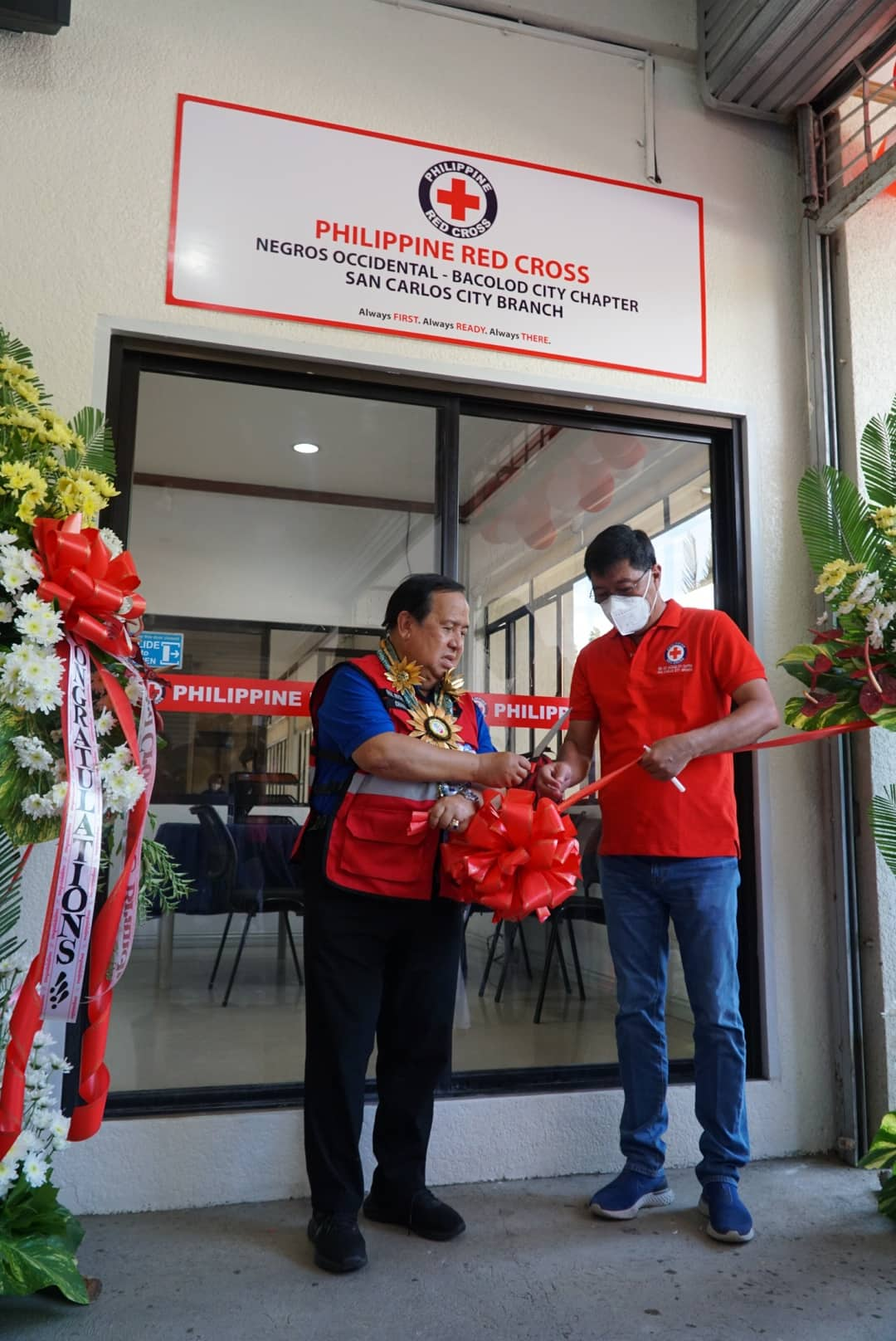
Celebrating its 75th Founding Anniversary, the Philippine Red Cross (PRC) announced the approval of additional three branches on May 12, 2022.
The announcement was management’s implementation of the directive of the Board of Governors to set up the Alang-alang Branch in Leyte Chapter and La Carlota City and San Carlos City Branches in Negros Occidental-Bacolod City Chapter.
The newly established branches in Visayas are a fulfillment of the PRC’s mandate to support the government by bringing its services and programs closer to the most vulnerable communities. In coordination with the Leyte Chapter in Tacloban City and Alang-alang Municipality, the Alang-alang branch has scheduled its Mobile Blood Donation to make blood more accessible to the community. Likewise, La Carlota City and San Carlos City branches have started providing blood services to their communities.
In addition, these branches have ongoing recruitment for Red Cross 143 and Red Cross Youth Council members.
“Sa paggunita natin ng ating ika-75 anibersaryo, handog ng Red Cross ang mga bagong branches para sa ating mga kababayan sa Visayas. Makatitiyak ang ating mga kababayan na mas malapit na ang mga serbisyong ating ibabahagi sa kanila,” Chairman and CEO Richard Gordon said.
To date, the PRC has 102 active chapters with 40 branches nationwide that are always first, always ready, and always there to provide sustained and effective humanitarian services.

The Philippine Red Cross (PRC) today called on runners and cyclists anew to join Million Volunteer Run 6 (MVR 6), its annual fundraising and volunteer recruitment activity. The event is extended up to June 12, 2022, with a virtual gathering of participants as the event’s finale.
MVR 6 is a non-competitive event that allows participants to complete their preferred category and distance at their own pace. They bike and/or run by themselves or in groups and upload their individual photo documentation on the event’s dashboard.
Major prizes consist of three Ogawa massage chairs, eight Trek bikes, and ten Php10,000.00 cash-prize. Minor prizes include one laptop, three tablets, five Airpods Pro, three Fitbit Versa 2 smartwatches, and five Fitbit Inspire 2 trackers.
MVR is a concrete way the public can join PRC’s network of volunteers in helping people made vulnerable by emergencies and disasters.
Registration is still open, through https://bit.ly/MillionVolunteerRun6.












